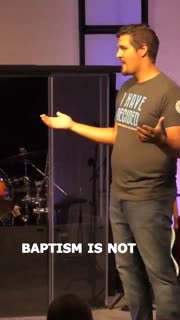Embracing Community: Judgment, Growth, and Grace
Devotional
Sermon Summary
Bible Study Guide
Sermon Clips
### Quotes for Outreach
1. "Baptism is not a personal celebration. It is supposed to be a church-wide celebration. Amen? So, come be part of that with us today." [31:17] (7 seconds)
2. "What are you hoping to get out of your relationship with others? Are you hoping to be somebody that is so far above reproach that no one dare refute you? Are you hoping to be someone that you get to feel better about yourself because of the faults of others?" [33:33] (23 seconds)
3. "Are you willing to be part of a group of people that will risk the rejection in a relationship to be honest and to speak truth? Are you willing to be somebody that is willing to let others judge you?" [34:26] (18 seconds)
4. "We have a natural kind of tendency that we want to help other people. And sometimes it's for the right reasons and sometimes it's for the wrong reasons. Sometimes I want to actually help you, but sometimes I want to help you because I don't want to confront my own issue. I'd rather work on yours." [40:15] (18 seconds)
5. "Are you wanting to be somebody people dare not refute? Or somebody that people can come to for truth? Are you wanting to hide or be offended when someone says you're wrong? Or are you wanting to help your church? Are you wanting the help of your church to be able to work on these areas?" [58:02] (23 seconds)
### Quotes for Members
1. "The problem is, Scripture doesn't actually teach that. But it does teach that we're not supposed to judge. But it also teaches the benefit of when you live, when you live in a community of people that can be honest with you. That can tell you hard things. That can point out sin in your life." [32:40] (24 seconds)
2. "Jesus uses the word hypocrite. You know, the English definition of the word hypocrite is someone who indulges in the practice of claiming to have moral standards or beliefs to which one's own behavior does not conform. Somebody that is willing to hold you to a standard that they are themselves not willing to live by." [49:17] (25 seconds)
3. "What if the dirt is on the inside? You've got to take the whole thing apart. You've got to decide how committed are you to saving this camera? Are you willing to do the work?" [53:04] (12 seconds)
4. "I told you earlier about my debilitating problem with insecurity. You want to know how the Lord helped me with that? He had to convince me that He loved me. I wish I could tell you that it was like the day that I gave my life to Jesus that problem went away, but it wasn't. Actually, it was eight years later." [53:29] (24 seconds)
5. "What kind of relationship do you want with the church? With his church? Do you want to be somebody that's open to the exchange of grace? To the exchange of correction? Do you want to be somebody that is willing to receive others exactly how they are and not judge them because they don't meet your definition of perfect or righteous or disciple?" [01:00:09] (38 seconds)
Ask a question about this sermon
1. "Baptism is not a personal celebration. It is supposed to be a church-wide celebration. Amen? So, come be part of that with us today." [31:17] (7 seconds)
2. "What are you hoping to get out of your relationship with others? Are you hoping to be somebody that is so far above reproach that no one dare refute you? Are you hoping to be someone that you get to feel better about yourself because of the faults of others?" [33:33] (23 seconds)
3. "Are you willing to be part of a group of people that will risk the rejection in a relationship to be honest and to speak truth? Are you willing to be somebody that is willing to let others judge you?" [34:26] (18 seconds)
4. "We have a natural kind of tendency that we want to help other people. And sometimes it's for the right reasons and sometimes it's for the wrong reasons. Sometimes I want to actually help you, but sometimes I want to help you because I don't want to confront my own issue. I'd rather work on yours." [40:15] (18 seconds)
5. "Are you wanting to be somebody people dare not refute? Or somebody that people can come to for truth? Are you wanting to hide or be offended when someone says you're wrong? Or are you wanting to help your church? Are you wanting the help of your church to be able to work on these areas?" [58:02] (23 seconds)
### Quotes for Members
1. "The problem is, Scripture doesn't actually teach that. But it does teach that we're not supposed to judge. But it also teaches the benefit of when you live, when you live in a community of people that can be honest with you. That can tell you hard things. That can point out sin in your life." [32:40] (24 seconds)
2. "Jesus uses the word hypocrite. You know, the English definition of the word hypocrite is someone who indulges in the practice of claiming to have moral standards or beliefs to which one's own behavior does not conform. Somebody that is willing to hold you to a standard that they are themselves not willing to live by." [49:17] (25 seconds)
3. "What if the dirt is on the inside? You've got to take the whole thing apart. You've got to decide how committed are you to saving this camera? Are you willing to do the work?" [53:04] (12 seconds)
4. "I told you earlier about my debilitating problem with insecurity. You want to know how the Lord helped me with that? He had to convince me that He loved me. I wish I could tell you that it was like the day that I gave my life to Jesus that problem went away, but it wasn't. Actually, it was eight years later." [53:29] (24 seconds)
5. "What kind of relationship do you want with the church? With his church? Do you want to be somebody that's open to the exchange of grace? To the exchange of correction? Do you want to be somebody that is willing to receive others exactly how they are and not judge them because they don't meet your definition of perfect or righteous or disciple?" [01:00:09] (38 seconds)










